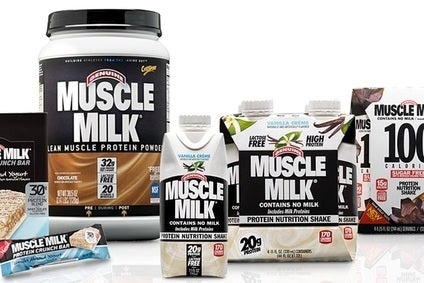
US group Hormel Foods has been busy looking for acquisitions in recent quarters, succeeding in some places and apparently being thwarted elsewhere. Announcing its third-quarter results yesterday (21 August), the Skippy peanut butter maker indicated it was ready to make more deals.
Hormel has made two acquisitions in the last 18 months. In June, the company announced a deal to buy US sports nutrition group CytoSport, the owner of brands including Muscle Milk protein drinks. At the start of 2013, Hormel swooped to buy the Skippy brand from Unilever for around US$700m.

Discover B2B Marketing That Performs
Combine business intelligence and editorial excellence to reach engaged professionals across 36 leading media platforms.
The acquisitions have both helped to further diversify a company founded in the 1890s on pork and one which, while still investing in building a value-added pork products business, has been looking to expand into other parts of the industry to reduce the impact of raw material volatility.
However, not all of Hormel’s acquisition attempts have been successful. It was reported to have been interested in Unilever’s North American cooking sauces business, which ended up being sold to Japan’s Mizkan Group.
After Hormel’s third-quarter results were announced yesterday – numbers that included earnings per share that beat Wall Street forecasts – analysts quizzed the group about its M&A ambitions and the company said it was ready to pounce again.
“We certainly have the bandwidth to do another acquisition,” investor relations director Jana Haynes said.

US Tariffs are shifting - will you react or anticipate?
Don’t let policy changes catch you off guard. Stay proactive with real-time data and expert analysis.
By GlobalDataHaynes said Hormel’s Specialty Foods division, the part of the business into which CytoSport is being integrated, “might have trouble doing another one right on top” of that deal, but she added: “We certainly would have the ability to do it from an organisational perspective. It’s finding the right transaction that has the strategic fit, that has the number one or number two brand, looking for something that is accretive to our margins and where we can really add some value.”
Hormel has enjoyed rising sales and profits in the year to date. However, analysts believe the company needs to make more deals to hit its long-term targets. Hormel has been investing in building a broader business through acquisitions and looked to add value to its pork business through innovation but some industry watchers believe M&A is needed to boost its growth prospects.
“Hormel generates much of its profits from mature categories with limited organic growth prospects, so we believe management will need acquisitions if it is to reach its long-term targets of 5% sales and 10% earnings growth,” Morningstar analyst Liang Feng wrote last month.
Analysts were keen to hear more about Hormel’s plans for CytoSport. Jeffrey Ettinger, Hormel’s chairman, president and CEO, said the company had been asked in the wake of the deal what “Hormel brings to the party when it comes to the acquisition”.
He said: “We have knowledge of manufacturing and of the category, that perhaps has been overlooked a little bit, I mean our Specialty Foods group is a less branded group, and so sometimes doesn’t get talked about quite as much, but we’ve been manufacturing both powdered and ready-to-drink protein items for over ten years with our Century Foods business unit that’s under Specialty Foods. This was a great opportunity to bring a branded catalyst for that group to build apply that knowledge, the way we do in the rest of our companies to a branded item.”
Ettinger said Hormel could improve CytoSport’s distribution and boost the company’s recent performance through NPD. The Hormel boss claimed CytoSport had admitted it had lost focus while the business was being sold.
“We feel we’re going to be able to bring deeper sales and category management skills to the largest market for this product line, which is the food, drug and mass market where we sell so many of our other items,” Ettinger said.
“We also feel our innovation track record bodes well in terms of coming up with great new items that would fit under this brand. We’re very early on; the category growth that we’re looking at is still very significant. Our feeling and even the prior management kind of conceded to us there was prior a little bit of lack of focus as they were in the sale process … and so their share has not quite kept up with all the category growth, but notwithstanding that, I mean it still grew in terms of both the ready-to-drink components … so it should be a great growth catalyst for Hormel going forward.”
Strategically, Ettinger said central to the CytoSport acquisition was to further tailor Hormel’s business towards more convenient products, in tune with consumer trends in the US.
“We … had identified that we really thought we needed to provide more on the go offerings, and so hence our innovation with Rev, that was a big motivator frankly behind the Muscle Milk acquisition was that – people are viewing those items in many cases as meal replacements, consumed on-the-go. And so again we are looking in most cases for leading share brands that we can drive with our marketing and hopefully operate on an efficient basis.”
Morningstar’s Feng does have a note of caution about Hormel’s M&A ambitions. “While we are impressed with management’s execution, we are wary of blindly assuming that Hormel’s unannounced acquisitions will generate excess returns and close the shortfall. CPG acquirers have bid up transaction multiples due to cheap financing, so it will be difficult for Hormel to identify opportunities that meet its return threshold, especially since the firm has rarely strayed from its net cash position.”





